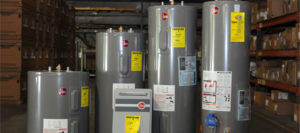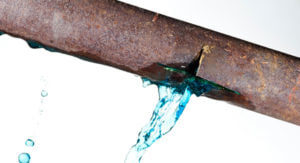Like any appliance, water heaters break down over time and need to be replaced. No one enjoys taking a cold shower, so ideally, you’d like to be able to replace your water heater before it completely stops working. If you wait too long, it could lead to a much larger problem. Such as, large leaks and water damage to your home. So how do you know when it’s time for a replacement? Here are a few clues:
Water Heater Replacement Clue #1: Age
The older the water heater, the more likely it is to break down. As a general rule, a tank type water heater will last, on average 8 to 10 years. Electric water heaters generally last 8 to 10 years, while gas water heaters may have a slightly shorter lifespan of 6 to 8 years.
With proper maintenance and a little luck, you may be able to nearly double the lifespan of your water heater. But sometimes even with the best care, a water heater will need to be replaced after only a few years. However, if your water heater is pushing the 10-year point, there’s a good chance it’s time to replace the unit.
If a new water heater is in your future, you may want to consider a tankless model, especially if your household doesn’t have large hot water needs. Tankless units have a considerably longer lifespan, and some manufacturers even offer lifetime warranties against their units from leaking.
Water Heater Replacement Clue #2: Rust and corrosion
Check your tank for any rust or corrosion. Most hot water tanks are made out of steel and will eventually rust. You may have even noticed rust in your hot water as it is drawn from the tap. If you find rust or corrosion by the temperature and pressure relief valve, and/or the water inlet and outlet connections, it’s a good indication that your tank is rusting and needs to be replaced. Unfortunately, there is not a way to repair a tank once it has started to rust and corrode. If your water heater has not started to leak, it will only be a matter of time.
Where your water heater is located within your home may determine your next step. Leaking water can cause thousands of dollars of damage to your home. Your best option may be to replace your water heater right away to prevent unnecessary expenses and damage. However, if your tank is located in a garage, you may choose to wait until it begins leaking, as the water damage may be minimal.
Water Heater Replacement Clue #3: Unable to drain water through the drain valve
Over time sediment builds and settles inside the bottom of the water heater’s tank. If you have a gas water heater, you may have noticed a popping sound when the burner ignites. However, regardless of the fuel source, sediment build-up is a problem for both electric and gas water heaters. Over time, the sediment build-up will break down the interior of the tank, and it may even clog the drain valve.
Flushing your water heater once a year will help prevent damage and extend the life of your water heater. By following these steps, you may be able to unclog the drain valve yourself. However, there is always the possibility that the sediment may reach a point where the tank can no longer be drained. It should be noted that in severe cases leaks can develop when the sediment is agitated during the draining process.
You could call a professional plumber to assist you, however, there is a good chance that in the end, you’ll need to replace your water heater.
Water Heater Replacement Clue #4: Your hot water tank is leaking
A leak from your hot water tank is usually caused by an internal problem and is rarely repairable. You can follow these steps to determine where the leak is originating, however, if you find the leak is coming from the tank itself, you’ll most likely need to replace your water heater.
In order to prevent further water damage to the room, turn off the water and power to your water heater and call a professional plumber to install a new unit.
Water Heater Replacement Clue #5: Your water is lukewarm or cold
If you find your water isn’t as hot as it once was, or worse, it isn’t hot at all, then something is clearly wrong. There may be a problem with the heating element, or the electric thermostat. It’s not uncommon for these parts to fail entirely or simply malfunction over time.
Another possible cause is a broken dip tube within the tank. This can cause the outgoing hot water to be diluted by the incoming cold water, resulting in cooler than desired hot water.






